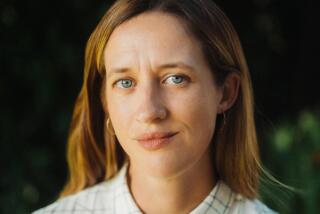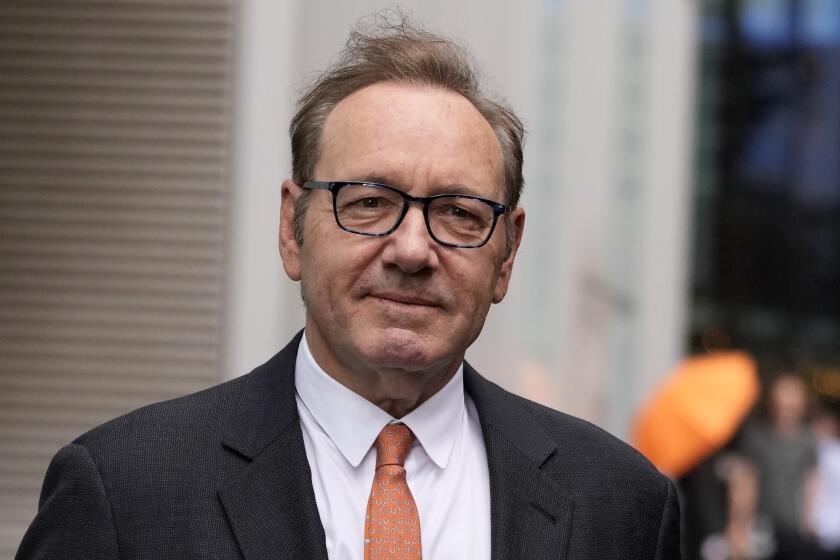Gurinder Chadha drew on painful family history from the Partition of India to direct ‘Viceroy’s House’

In the back of her mind, Gurinder Chadha always thought about the movie she might one day make, one that would revolve around one of the most dramatic and misunderstood events in the history of India, her ancestral home.
The London-based filmmaker, best known for her 2002 international smash “Bend It Like Beckham,” grew up hearing stories about the Partition, which, in 1947, annexed part of India and created the new nation of Pakistan, displacing millions, including her own family.
“I’ve been dying to make a film around it for as long as I can remember,” she said during an interview in Hollywood recently. “But I never had the courage because it was so personal. Also, who wants to talk about the Partition? Nobody!”
A series of events, including the birth of her twins a decade ago, and a trip back to her grandparent’s home in a part of India which became part of Pakistan, galvanized Chadha into action.
The result is “Viceroy’s House’” a historical drama set in the waning days of British rule in India, starring Hugh Bonneville as Lord Louis Mountbatten, the last viceroy of India, and Gillian Anderson as his wife, Edwina. The film opens in limited release in Los Angeles on Sept. 1.
The Mountbattens arrive at their new post — along with daughter Pamela (Lily Travers), ostensibly to help the nation smoothly transition to independence. That doesn’t happen.
Instead, as the clock struck midnight on the night of Aug. 14, 1947, the country was cleaved in two: Muslims headed to the new Pakistan, and Sikhs and Hindus decamped to other parts of the nation. Chadha’s grandmother, a Sikh, was forced to leave the family home in Jhelum, India, with her five young children, for a three-day train journey with no food or water for a refugee camp; the youngest child, a 2-year old girl, died of starvation on the way.
“It was the biggest forced migration in human history,” said Chadha, 57. “Fourteen million people became refugees, and nobody knows about it. It’s part of the British Raj that nobody talks about. In the end, what I wanted to do was a shine a lot on it, that this is what happened to my family.”
The majority of the film takes place in the run-up to that night, showing the Mountbattens settling into their opulent new 340-room digs, with their 500 “indoor servants.” (Chadha was able to shoot the exterior scenes at the original Viceroy’s House in New Delhi, now the Indian president’s residence).
For the interior shots, production shifted to Umaid Bhawan, built by the maharaja of Jodhpur. These settings provide a grand unfurling of color and ceremony: hundreds of finely liveried staff, landscaped gardens in which the Mountbattens took tea with the statesmen of the day: Mahatma Gandhi, Jawaharlal Nehru and Pakistan’s founder, Muhammad Ali Jinnah. Behind the scenes, British political machinations play out, fomenting hatred between Hindus and Muslims, and destroying the burgeoning romance between Jeet (Manish Dayal), the Hindu valet to Mountbatten, and Aalia (Huma Qureshi), a Muslim girl.
The film has opened in several countries, including Australia, France and the United Kingdom, so far bringing in about $6.7 million in box office. It has been banned in Pakistan because authorities there disagreed with the way in which Jinnah is represented. It also opened earlier this month in India, under the name “Partition: 1947,” to solid reviews. (The Times of India described it as “timely and riveting.”)
Paul Mayeda Berges, Chadha’s husband and co-writer on the project alongside Moira Buffini, said their goal was “to make a human film with no obvious villains.
“It had to be an emotional film that gave a sense of how ordinary people suffered,” said Berges. “When you talk about creating borders and building walls, when you divide a country in terms of who you don’t want in, it will lead to turmoil. It happened then, and, to a certain degree, it’s happening now.”
Bonneville, for whom Mountbatten was a “visible public figure” throughout his childhood, said he was drawn in by the writers’ handling of the material.
They “went to incredible lengths to put on a screen a story that treated all sides with respect,” he said. “The epic narrative that unfolded has repercussions even today, so it’s worth being reminded, in a clear and unhysterical way, of how it began.”
That the story was such a big part of Chadha’s past, said Bonneville, makes all the difference.
“Gurinder’s energy and passion is legendary,” he said. “She’s a collaborative artist but this story, with threads of her own family’s history woven throughout its fabric, meant the world to her and without doubt that shows on screen.”
Still, Chadha said that success in the film business remains hard-won — especially if you are a woman of color — even if you made “Beckham,” a film that was a worldwide sensation and made stars of Keira Knightley and Parminder Nagra. In recent years she’s been writing screenplays and worked on British television series.
“I made ‘Bhaji On The Beach’ 25 years ago. I was the first Asian woman to make a feature film in Britain,” she noted. “With ‘Viceroy’s House,’ I’m still the only Asian woman making feature films in Britain. That’s such a sad statistic. It’s about being able to tell our stories, from our perspective. And for executives to have faith in and trust us. Because that’s when we can put out empowered, truthful stories full of integrity.”
More to Read
Only good movies
Get the Indie Focus newsletter, Mark Olsen's weekly guide to the world of cinema.
You may occasionally receive promotional content from the Los Angeles Times.










